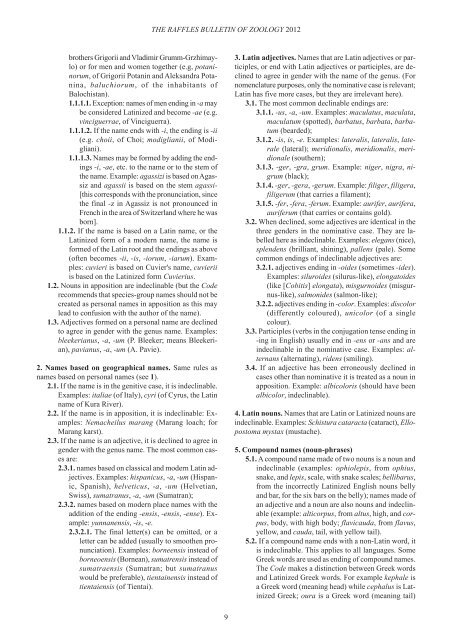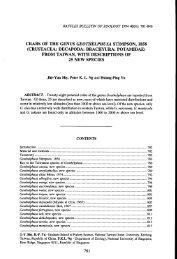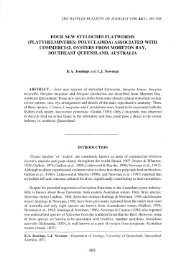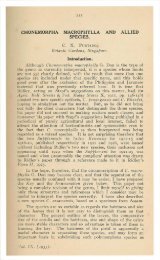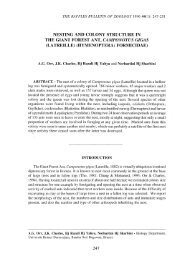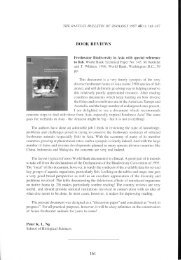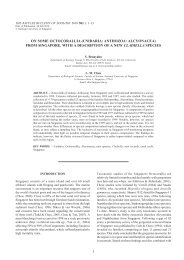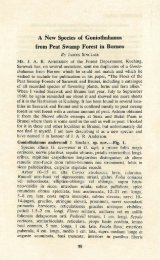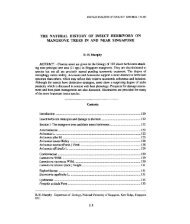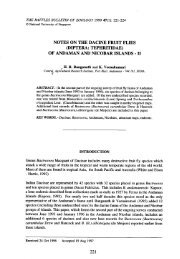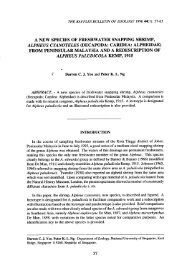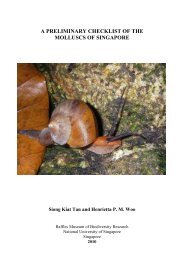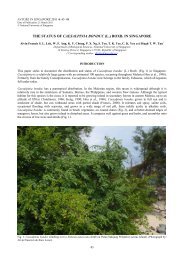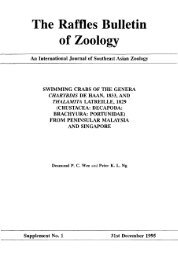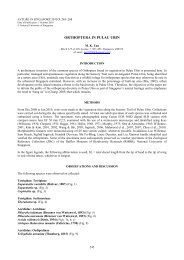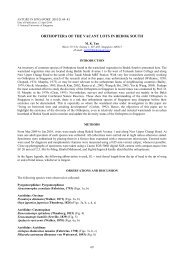Conspectus cobitidum - Raffles Museum of Biodiversity Research
Conspectus cobitidum - Raffles Museum of Biodiversity Research
Conspectus cobitidum - Raffles Museum of Biodiversity Research
You also want an ePaper? Increase the reach of your titles
YUMPU automatically turns print PDFs into web optimized ePapers that Google loves.
others Grigorii and Vladimir Grumm-Grzhimaylo)<br />
or for men and women together (e.g, potaninorum,<br />
<strong>of</strong> Grigorii Potanin and Aleksandra Potanina,<br />
baluchiorum, <strong>of</strong> the inhabitants <strong>of</strong><br />
Balochistan).<br />
1.1.1.1. Exception: names <strong>of</strong> men ending in -a may<br />
be considered Latinized and become -ae (e.g.<br />
vinciguerrae, <strong>of</strong> Vinciguerra).<br />
1.1.1.2. If the name ends with -i, the ending is -ii<br />
(e.g. choii, <strong>of</strong> Choi; modiglianii, <strong>of</strong> Modigliani).<br />
1.1.1.3. Names may be formed by adding the endings<br />
-i, -ae, etc. to the name or to the stem <strong>of</strong><br />
the name. Example: agassizi is based on Agassiz<br />
and agassii is based on the stem agassi-<br />
[this corresponds with the pronunciation, since<br />
the final -z in Agassiz is not pronounced in<br />
French in the area <strong>of</strong> Switzerland where he was<br />
born].<br />
1.1.2. If the name is based on a Latin name, or the<br />
Latinized form <strong>of</strong> a modern name, the name is<br />
formed <strong>of</strong> the Latin root and the endings as above<br />
(<strong>of</strong>ten becomes -ii, -is, -iorum, -iarum). Examples:<br />
cuvieri is based on Cuvier's name, cuvierii<br />
is based on the Latinized form Cuvierius.<br />
1.2. Nouns in apposition are indeclinable (but the Code<br />
recommends that species-group names should not be<br />
created as personal names in apposition as this may<br />
lead to confusion with the author <strong>of</strong> the name).<br />
1.3. Adjectives formed on a personal name are declined<br />
to agree in gender with the genus name. Examples:<br />
bleekerianus, -a, -um (P. Bleeker; means Bleekerian),<br />
pavianus, -a, -um (A. Pavie).<br />
2. Names based on geographical names. Same rules as<br />
names based on personal names (see 1).<br />
2.1. If the name is in the genitive case, it is indeclinable.<br />
Examples: italiae (<strong>of</strong> Italy), cyri (<strong>of</strong> Cyrus, the Latin<br />
name <strong>of</strong> Kura River).<br />
2.2. If the name is in apposition, it is indeclinable: Examples:<br />
Nemacheilus marang (Marang loach; for<br />
Marang karst).<br />
2.3. If the name is an adjective, it is declined to agree in<br />
gender with the genus name. The most common cases<br />
are:<br />
2.3.1. names based on classical and modern Latin adjectives.<br />
Examples: hispanicus, -a, -um (Hispanic,<br />
Spanish), helveticus, -a, -um (Helvetian,<br />
Swiss), sumatranus, -a, -um (Sumatran);<br />
2.3.2. names based on modern place names with the<br />
addition <strong>of</strong> the ending -ensis, -ensis, -ense). Example:<br />
yunnanensis, -is, -e.<br />
2.3.2.1. The final letter(s) can be omitted, or a<br />
letter can be added (usually to smoothen pronunciation).<br />
Examples: borneensis instead <strong>of</strong><br />
borneoensis (Bornean), sumatrensis instead <strong>of</strong><br />
sumatraensis (Sumatran; but sumatranus<br />
would be preferable), tientainensis instead <strong>of</strong><br />
tientaiensis (<strong>of</strong> Tientai).<br />
THE RAFFLES BULLETIN OF ZOOLOGY 2012<br />
9<br />
3. Latin adjectives. Names that are Latin adjectives or participles,<br />
or end with Latin adjectives or participles, are declined<br />
to agree in gender with the name <strong>of</strong> the genus. (For<br />
nomenclature purposes, only the nominative case is relevant;<br />
Latin has five more cases, but they are irrelevant here).<br />
3.1. The most common declinable endings are:<br />
3.1.1. -us, -a, -um. Examples: maculatus, maculata,<br />
maculatum (spotted), barbatus, barbata, barbatum<br />
(bearded);<br />
3.1.2. -is, is, -e. Examples: lateralis, lateralis, laterale<br />
(lateral); meridionalis, meridionalis, meridionale<br />
(southern);<br />
3.1.3. -ger, -gra, grum. Example: niger, nigra, nigrum<br />
(black);<br />
3.1.4. -ger, -gera, -gerum. Example: filiger, filigera,<br />
filigerum (that carries a filament);<br />
3.1.5. -fer, -fera, -ferum. Example: aurifer, aurifera,<br />
auriferum (that carries or contains gold).<br />
3.2. When declined, some adjectives are identical in the<br />
three genders in the nominative case. They are labelled<br />
here as indeclinable. Examples: elegans (nice),<br />
splendens (brilliant, shining), pallens (pale). Some<br />
common endings <strong>of</strong> indeclinable adjectives are:<br />
3.2.1. adjectives ending in -oides (sometimes -ides).<br />
Examples: siluroides (silurus-like), elongatoides<br />
(like [Cobitis] elongata), misgurnoides (misgurnus-like),<br />
salmonides (salmon-like);<br />
3.2.2. adjectives ending in -color. Examples: discolor<br />
(differently coloured), unicolor (<strong>of</strong> a single<br />
colour).<br />
3.3. Participles (verbs in the conjugation tense ending in<br />
-ing in English) usually end in -ens or -ans and are<br />
indeclinable in the nominative case. Examples: alternans<br />
(alternating), ridens (smiling).<br />
3.4. If an adjective has been erroneously declined in<br />
cases other than nominative it is treated as a noun in<br />
apposition. Example: albicoloris (should have been<br />
albicolor, indeclinable).<br />
4. Latin nouns. Names that are Latin or Latinized nouns are<br />
indeclinable. Examples: Schistura cataracta (cataract), Ellopostoma<br />
mystax (mustache).<br />
5. Compound names (noun-phrases)<br />
5.1. A compound name made <strong>of</strong> two nouns is a noun and<br />
indeclinable (examples: ophiolepis, from ophius,<br />
snake, and lepis, scale, with snake scales; bellibarus,<br />
from the incorrectly Latinized English nouns belly<br />
and bar, for the six bars on the belly); names made <strong>of</strong><br />
an adjective and a noun are also nouns and indeclinable<br />
(example: alticorpus, from altus, high, and corpus,<br />
body, with high body; flavicauda, from flavus,<br />
yellow, and cauda, tail, with yellow tail).<br />
5.2. If a compound name ends with a non-Latin word, it<br />
is indeclinable. This applies to all languages. Some<br />
Greek words are used as ending <strong>of</strong> compound names.<br />
The Code makes a distinction between Greek words<br />
and Latinized Greek words. For example kephale is<br />
a Greek word (meaning head) while cephalus is Latinized<br />
Greek; oura is a Greek word (meaning tail)


